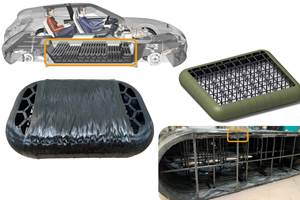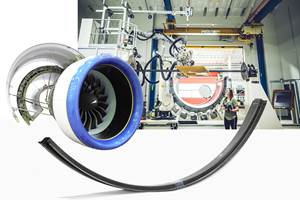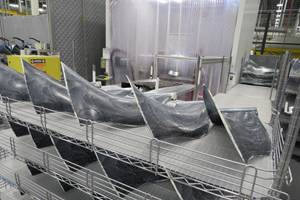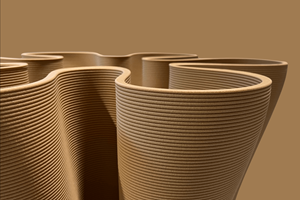Net-shape machining services available for structural foam core
CAMX 2024: In addition to its distribution of various product materials for the composites industry, Technology Marketing Inc. now assists in machined net-shaped Rohacell structural foam core to customer requirements.
Share
Technology Marketing Inc. (TMI, Salt Lake City, Utah, U.S.) is now able to offer machined net-shaped services for Rohacell structural foam core directly to its customers. As the North America distributor for the structural foam core, TMI says it has supplied and supported customers with Rohacell as a standard sheet form for more than two decades. TMI offers customers extensive knowledge supporting structural foam core requirements via its technical staff.
High-quality machined net-shape foam parts are attainable with the capabilities of a high precision five-axis CNC machine, featuring a table size of 125" × 80" with 36" in the Z-axis. Any part requirements are possible from first article developments to shapes with complex geometry. Capacity to support low- or high-volume part quantities are feasible for any project or application. Moreover, all part produced are processed with expert support and the proper tools to assure the highest quality standard is provided.
According to TMI, the quality of each part project or application produced is certified to conform to the requested requirement or specifications. The final net-shape foam parts are transported in sealed desiccant-enclosed MIL-PRF-131 aluminum bags to mitigate moisture uptake during transit.
As a supplier, TMI has offered innovative quality materials, services and technology supporting the advanced composites industry for more than 45 years. In addition to its Rohacell machined net-shaped services, TMI offers product materials for tooling, resins, cutting solutions, mold releases, processing materials, prepregs, woven and nonwoven reinforcements, hoses, abrasives, drilling and routing tools, surface cleaning, shop accessories and more.
Related Content
-
TU Munich develops cuboidal conformable tanks using carbon fiber composites for increased hydrogen storage
Flat tank enabling standard platform for BEV and FCEV uses thermoplastic and thermoset composites, overwrapped skeleton design in pursuit of 25% more H2 storage.
-
The potential for thermoplastic composite nacelles
Collins Aerospace draws on global team, decades of experience to demonstrate large, curved AFP and welded structures for the next generation of aircraft.
-
Plant tour: Albany Engineered Composites, Rochester, N.H., U.S.
Efficient, high-quality, well-controlled composites manufacturing at volume is the mantra for this 3D weaving specialist.
Related Content
TU Munich develops cuboidal conformable tanks using carbon fiber composites for increased hydrogen storage
Flat tank enabling standard platform for BEV and FCEV uses thermoplastic and thermoset composites, overwrapped skeleton design in pursuit of 25% more H2 storage.
Read MoreThe potential for thermoplastic composite nacelles
Collins Aerospace draws on global team, decades of experience to demonstrate large, curved AFP and welded structures for the next generation of aircraft.
Read MorePlant tour: Albany Engineered Composites, Rochester, N.H., U.S.
Efficient, high-quality, well-controlled composites manufacturing at volume is the mantra for this 3D weaving specialist.
Read MoreSulapac introduces Sulapac Flow 1.7 to replace PLA, ABS and PP in FDM, FGF
Available as filament and granules for extrusion, new wood composite matches properties yet is compostable, eliminates microplastics and reduces carbon footprint.
Read MoreRead Next
Technology Marketing Inc. to distribute VacPuc digital sensors
VacPuc is expanding its range of global distributors to deliver its vacuum pressure measurement solution to the composites market.
Read MoreRock West sandwich panels support high-power Astro Digital satellites
RWC built and delivered solar array substrate panels from trace/lead-integrated skins that enable direct integration with solar cells, saving weight and time.
Read More“Structured air” TPS safeguards composite structures
Powered by an 85% air/15% pure polyimide aerogel, Blueshift’s novel material system protects structures during transient thermal events from -200°C to beyond 2400°C for rockets, battery boxes and more.
Read More










